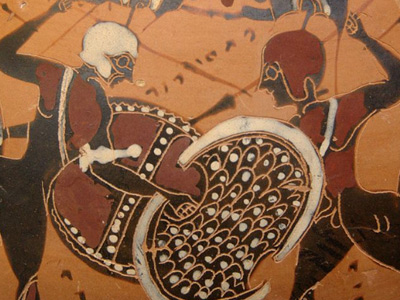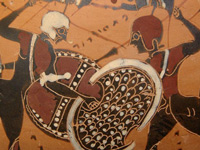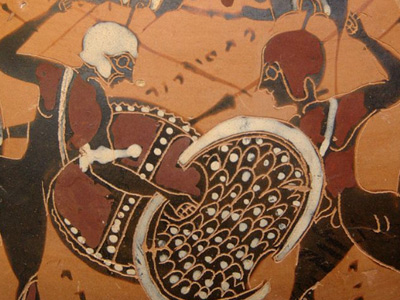First Peloponnesian War (460-445 BC)

After the Truce
The years after the truce were eventful ones in Greek politics. The Peace of Callias, if it existed, was concluded in 449 BC. It was probably in that same year that Pericles passed the Congress decree, calling for a pan-Hellenic congress to discuss the future of Greece. Modern scholars have debated extensively over the intent of that proposal; some regard it as a good faith effort to secure a lasting peace, while others view it as a propaganda tool. In any event, Sparta derailed the congress by refusing to attend.
In the same year the Second Sacred War erupted, when Sparta detached Delphi from Phocis and rendered it independent. In 448 BC, Pericles led the Athenian army against Delphi, in order to reinstate Phocis to its former sovereign rights over the oracle of Delphi.
In 447 BC a revolt broke out in Boeotia which was to spell the end of Athens' "continental empire" on the Greek mainland. Tolmides led an army out to challenge the Boeotians, but, after some early successes, was defeated at the Battle of Coronea. In the wake of this defeat, Pericles adopted a more moderate stance and Athens abandoned Boeotia, Phocis, and Locris.
The defeat at Coronea, however, triggered a more dangerous disturbance, in which Euboea and Megara revolted. Pericles crossed over to Euboea with his troops to quash the rebellion there, but was forced to return when the Spartan army invaded Attica. Through negotiation and possibly bribery, Pericles persuaded the Spartan king Pleistoanax to lead his army home. Back in Sparta, Pleistoanax would later be prosecuted for failing to press his advantage, and fined so heavily that he was forced to flee into exile, unable to pay. With the Spartan threat removed, Pericles crossed back to Euboea with 50 ships and 5,000 soldiers, crushing all opposition. He then inflicted a harsh punishment on the landowners of Chalcis, who lost their properties. The residents of Istiaia, who had butchered the crew of an Athenian trireme, were uprooted and replaced by 2,000 Athenian settlers. The arrangement between Sparta and Athens was ratified by the "Thirty Years' Peace" (winter of 446–445 BC). According to this treaty, Megara was returned to the Peloponnesian League, Troezen and Achaea became independent, Aegina was to be a tributary to Athens but autonomous, and disputes were to be settled by arbitration. Each party agreed to respect the alliances of the other.
HISTORY

RESOURCES
This article uses material from the Wikipedia article "First Peloponnesian War (460-445 BC)", which is released under the Creative Commons Attribution-Share-Alike License 3.0.
© Stories Preschool. All Rights Reserved.









